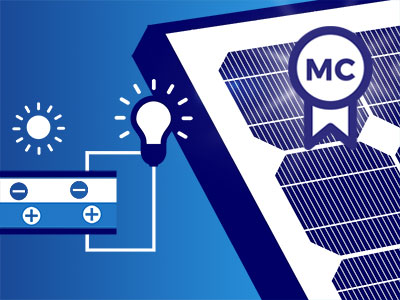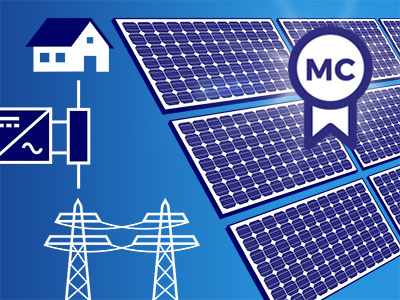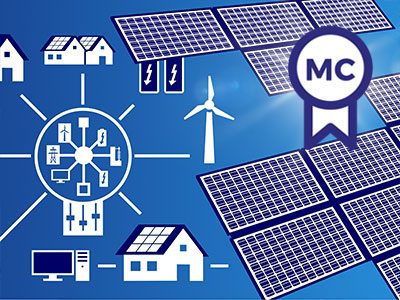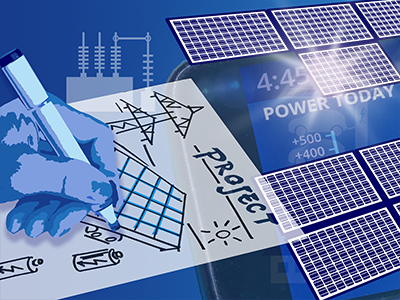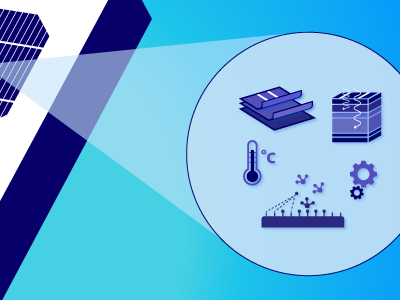Overview
Explore the main PV technologies in the current market, to gain in-depth knowledge on the design and processing methods of solar cells.
The technologies used to produce solar cells and photovoltaic modules are advancing to deliver highly efficient and flexible solar panels. In this course you will explore the main PV technologies in the current market. You will gain in-depth knowledge about crystalline silicon based solar cells (90% market share) as well as other emerging technologies including CdTe, CIGS and Perovskites. This course provides answers to the questions: How are solar cells made from raw materials? Which technologies have the potential to be the major players for different applications in the future?
MicroMaster Program
This course is part of the Solar Energy Engineering MicroMasters Program designed to cover all physics and engineering aspects of photovoltaics: photovoltaic energy conversion, technologies and systems.
What you'll learn:
- Design concepts and fabrication processes of various photovoltaic technologies,
- In-depth knowledge on the entire crystalline silicon solar cell landscape including,
- Market-leading polycrystalline based cells
- High efficiency/cutting edge monocrystalline based solar cells
- Application of thin film solar cells, like CIGS, CdTe, thin-film silicon, Perovskites,
- Concentrated PV and space applications for III/V semiconductor based solar cells.
Earn a Microcredential
After finishing this course, and passing the related exam, you are eligible to receive one microcredential. A microcredential is a digital certificate that allows learners to demonstrate the knowledge and skills acquired after successfully completing a small unit of education. It describes the learning outcomes, educational level and scope of the course or program – and adds a quality mark, as it is bound to a recognized quality framework. This certification is awarded to participants who enroll and complete the course starting on February 22, 2024 or later. For more information, please read the FAQ.
Details
Course Syllabus
Part 1. Crystalline silicon
Week 1. Introduction & Crystalline Silicon I
1.2 Introduction to Silicon
1.3 Silicon Processing
Week 2. Crystalline Silicon II
2.1 c-Si Solar Cell Design
2.2 Advanced cell design
2.3 From cell to module
Part 2. Solar Cell Characterization
Week 3. Solar cell characterization
3.1 J-V Measurement
3.2 EQE Measurement
3.3 Reflectance - Transmittance Measurement
3.4 Lifetime Measurement
EXAM
Part 3. Thin Film Processing
Week 4. Thin Film Processing
4.1 Thin Film Design
4.2 Thin Film Deposition
Part 4. Thin Film Technologies
Week 5. Thin Film Silicon
5.1 TF Silicon Properties
5.2 Major Challenges
5.3 TF Silicon Processing
5.4 State of the Art TF Silicon Devices
EXAM
Week 6. Chalcogenides & III-V Technologies
6.1 Chalcogenides - CIGS
6.2 Chalcogenides - CdTe
6.3 III-V - Material and Devices
6.4 III-V - Special Applications
Week 7. Organic Photovoltaics
7.1 OPV Basics
7.2 OPV Technologies
7.3 Perovskites
Part 5. Comparing and Combining Technologies
Week 8. Comparing & Combining Technologies
8.1 Comparing PV Technologies
8.2 Hybrid PV Devices
8.3 Hybrid PV Systems
EXAM
License
Unless otherwise specified, the Course Materials of this course are Copyright Delft University of Technology and are licensed under a Creative Commons Attribution-NonCommercial-ShareAlike 4.0 International License.
FAQ
Q: What is a Microcredential
A Microcredential (hereafter: "MC") is a digital certificate that allows learners to demonstrate the knowledge and skills acquired after successfully completing a small unit of education. It describes the learning outcomes, educational level and scope of the course or program – and adds a quality mark, as it is bound to a recognized quality framework.
You will receive your MC as a digital certificate (called "Edubadge"), offered by the Dutch institution SURF. The certificates are publicly available (via an URL), can be easily shared, and can be instantly verified by other educational institutions or employers.
MCs are only used for courses or programs that comply with the Dutch national quality framework for microcredentials. MCs were recently launched in The Netherlands, with the aim to be recognized as accreditation-worthy education, specifically for continuing education programs. MCs do not have an expiration date and are managed online by the learners themselves (through the Edubadge platform of Surf).
Even if you do not live in The Netherlands, you will benefit from this MC since it will give an additional quality mark to the certificates issued by edx.org.
Note that the MCs do not replace the certificates issued by edX, and can be obtained in addition. Moreover, there is no MC for the full Micromasters program, only per course (for the full program you will still receive the certificate issued by edX.)
Q: How to obtain the MC?
A learner qualifies for a MC per course after successfully completing a course and the exam associated with this course (for example, after completing PV1 course and PV1 exam you are eligible for one MC).
To obtain your Microcredential you will need to create an EduID and connect to the Edubadges platform. After that you can access your “Edubadges backpack” in which you can store and manage your Microcredentials. For more information please visit this page: https://wiki.surfnet.nl/display/Edubadges/Aanmaken+backpack#English
More information about obtaining the MCs will be given during the course.
Q: What do MC mean for my personal data?
Please note TU Delft uses personal data in issuing Microcredentials. Learners need to create a “backpack” on Edubadges.nl which is managed by SURF to be able to claim and manage their Microcredentials. To learn more about how TU Delft uses your personal data in relation to Microcredentials read the privacy statement that can be found in the course platform.
Qualifications
Chartered Engineering Competences
All our online courses and programs have been matched to the competences determined by KIVI’s Competence Structure, a common frame of reference for everyone, across all disciplines, levels and roles.
These competences apply to this course:
- A1: Extend your theoretical knowledge of new and advancing technologies.
- B2: Conduct appropriate research, and undertake design and development of new and creative engineering solutions.
- E3: Undertake engineering activities in a way that contributes to sustainable development and a circular economy.
Admission
This is a MicroMaster Course that runs on EdX.
Prerequisites
- Bachelor's degree in Science or Engineering and/or the successful completion of PV1x (or firm grasp of its content).
